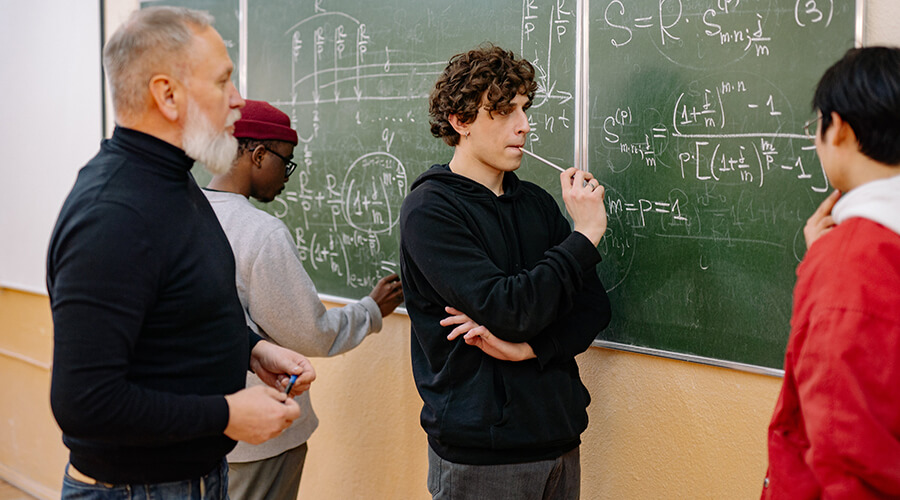Essential Skills and Strategies
for Math Teachers
See also: Real-World Maths
In the field of education, mathematics teachers play a vital role. Their significance is especially important in primary and secondary educational settings where students must learn the fundamentals of mathematical competence and confidence.
Fundamental mathematics skills are essential in preparing students for further studies or real-life applications. Therefore, teachers must come prepared to achieve this goal.
To excel in this profession, they must possess a blend of pedagogical expertise, subject knowledge, and classroom management skills. They must also continuously adapt their teaching strategies to meet the diverse needs of their students.
This article will delve into mathematics education, exploring the essential skills and strategies indispensable for math teachers.

Qualities of a Good Math Teacher
Each math teacher is unique. After all, students in different areas and grade levels have different learning styles, needs, and preferences.
However, there are some common traits and characteristics shared by good math teachers. Here are some skills and qualities that aspiring teachers should learn, and experienced educators should maintain:
Passion for the subject
At the heart of every exceptional math teacher lies a deep passion for the subject.
Having a passionate teacher can help transform math lessons from boring to fascinating. This enthusiasm for knowledge is contagious, inspiring students to learn and develop a genuine interest in mathematics.
Math is often a subject that many students dread. A passionate teacher helps take the subject from scary or boring to fun and exciting. They can bring concepts to life and communicate them better to students.
Good and passionate math teachers can often better translate complex ideas into understandable, applicable, and exciting lessons students can remember.
Communication skills
Effective communication is the bedrock of teaching. A good math teacher possesses the ability to explain complex mathematical concepts in a clear, concise, and relatable manner.
Some good mathematicians and practitioners can be excellent at applying mathematical concepts. However, it takes a unique skill to make complex mathematical topics more digestible to the ordinary student.
A good math teacher can bridge the gap between mathematical abstraction and real-world applications, making math accessible to students of all levels. Through their excellent communication skills, they ensure every student has the opportunity to grasp and appreciate the beauty of the subject.
Adaptability
Good teachers understand that every student is unique. A strategy that might work for a particular group of students might not work for others. Math teachers must readily observe this gap and adjust their style to accommodate their students.
The field of education is constantly evolving, and a good math teacher must be adaptable. They must be open to new teaching methods and technologies, recognizing that each student learns differently.
Organizational skills
Mathematics is a structured subject that builds progressively on fundamental concepts. A good math teacher must have good organizational skills and plan their lessons accordingly. They must ensure each lesson flows logically from the previous one, guiding students effectively.
Aside from planning their lessons, they must create a cohesive curriculum that follows established standards for each grade level. They must also curate appropriate resources and teaching aids, such as educational activities, games, videos, or apps like DoodleLearning.
Organizational skills also include time management. This skill allows them to cover curriculum objectives efficiently while fostering a deeper understanding of mathematical concepts.
Approachability
A good math teacher creates a classroom environment where students feel comfortable to ask questions, seek clarification, and share their thoughts. They actively listen to their students’ concerns and provide constructive feedback.
An approachable demeanor is essential for building strong teacher-student relationships, especially in more technical subjects like mathematics. This approachability fosters a safe and supportive space for students to explore math without fear of judgment.
Learning and professional development
Mathematics and math education are evolving fields, with new knowledge and strategies coming to light as time passes. Math teachers should stay updated with these advancements and teaching methodologies.
A good math teacher doesn’t stop their learning at obtaining their education degree. They must remain committed to continuous learning and further developing their skills and knowledge.
They seek opportunities for collaboration with colleagues, attend workshops, and participate in ongoing education to refine their teaching skills and remain at the forefront of math education.
Best Strategies for Teaching Mathematics

Effective mathematics teaching requires more than just presenting facts and formulas. It demands a strategic approach that fosters deep understanding and critical thinking.
Here are some of the best strategies teachers can use to aid their teaching practice:
High expectations
While high expectations can sometimes seem intimidating, they can help raise students’ performance and confidence in classes. When students believe in their ability to excel in math, they are more likely to put in the effort required for success.
A good math teacher is encouraging and believes in their students’ potential, which can challenge students to perform better and become achievers in the subject. This strategy instills a growth mindset, encouraging students to face challenges and view mistakes as opportunities for learning and growth.
Explicit instructions
While games and other fun activities can help deepen students’ understanding, nothing beats explicit instructions in communicating fundamental mathematical concepts.
Lessons must always include parts where the teacher lays out mathematical concepts in a straightforward manner. The teacher must break down complex topics and mathematical processes into manageable steps and understandable explanations.
Explicit instructions help demystify math and its various concepts, making them more accessible to students at all proficiency levels.
Tools for conceptual understanding
Mathematics is not just about memorizing procedures. It’s about developing a deep conceptual understanding. To help students achieve this understanding, math teachers can use various tools, visual aids, and math manipulatives.
These tools could include physical objects like blocks or virtual tools like interactive apps and software. Visual representations and hands-on activities can make abstract mathematical ideas more tangible. As a result, students become better able to connect mathematical theories to real-life applications.
Cooperative learning
Collaboration is a powerful strategy in math education. Cooperative learning encourages students to work together, discuss ideas, and solve problems as a team. Pairing students with different capabilities and proficiency levels can help them hone each other’s skills and understanding.
Group and pair setups enhance students’ understanding of mathematical concepts and foster communication and critical thinking skills. Group activities, peer teaching, and collaborative projects create an engaging and interactive classroom environment that promotes active learning.
Regular homework assignments
Homework assignments allow students to practice what they have learned in class independently.
Consistent and thoughtfully designed homework assignments reinforce skills and concepts and provide opportunities for self-assessment. They are also an effective avenue for helping students prepare for quizzes and exams.
Like in classroom lessons, teachers can also make homework assignments more interesting through various teaching aids like board games, mobile apps, and visual representations.
Effective math teachers strike a balance between assigning enough homework to reinforce learning without overwhelming students.
Refining Math Teaching Practices
Math education, and education in general, involves a unique cocktail of essential skills and strategies to help teachers and students communicate effectively.
Good math teachers must always be on the lookout for ways to improve their pedagogy and how they relate to students. Effective teachers help students grasp essential concepts, build their confidence, and encourage them to excel.
References:
- https://online.maryville.edu/blog/inspiring-a-love-for-numbers-qualities-of-a-good-math-teacher/
- https://www.weareteachers.com/strategies-in-teaching-mathematics/
- https://resilienteducator.com/classroom-resources/basic-math-teaching-strategies/
About the Author
Ivan Serrano: I have been a technology and business writer since 2015 working with companies like SmallBizClub, StartupNation, Namecheap and Time Doctor. I have loved writing my whole life and being in business development has given me a unique perspective. I'm obsessed with our constantly evolving fast-paced society and finding new ways to integrate that into amazing content that teaches the readers something new.
